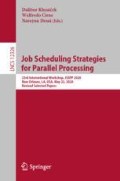Abstract
For more than two decades researchers have been analyzing the impact of inaccurate job walltime (runtime) estimates on the performance of job scheduling algorithms, especially the backfilling. In this paper, we extend these existing works by focusing on the overall impact that improved walltime estimates have both on job scheduling performance and predictability. For this purpose, we evaluate such impact in several steps. First, we present a simple walltime predictor and analyze its accuracy with respect to original user walltime estimates captured in real-life workload traces. Next, we use these traces and a simulator to see what is the impact of improved estimates on general performance (backfilling ratio and wait time) as well as predictability. We show that even a simple predictor can significantly decrease user-based errors in runtime estimates, while also slightly improving job wait times and backfilling ratio. Concerning predictions, we show that walltime predictor significantly decreases errors in job wait time forecasting while having little effect on the ability of the scheduler to provide solid advance predictions about which nodes will be used by a given waiting job.
Access this chapter
Tax calculation will be finalised at checkout
Purchases are for personal use only
Notes
- 1.
In case that a given user has either no or less than five completed jobs then we use the user-provided estimate or those few already completed jobs, respectively.
- 2.
With the exception of poor user-based estimates as shown in case of FH1 workload.
References
Chiang, S.-H., Arpaci-Dusseau, A., Vernon, M.K.: The impact of more accurate requested runtimes on production job scheduling performance. In: Feitelson, D.G., Rudolph, L., Schwiegelshohn, U. (eds.) JSSPP 2002. LNCS, vol. 2537, pp. 103–127. Springer, Heidelberg (2002). https://doi.org/10.1007/3-540-36180-4_7
Feitelson, D.G.: Parallel workloads archive, February 2018. http://www.cs.huji.ac.il/labs/parallel/workload/
Feitelson, D.G., Weil, A.M.: Utilization and predictability in scheduling the IBM SP2 with backfilling. In: 12th International Parallel Processing Symposium, pp. 542–546. IEEE (1998)
Klusáček, D., Chlumský, V.: Evaluating the impact of soft walltimes on job scheduling performance. In: Dalibor Klusáček, N.D., Walfredo C., (eds.) Job Scheduling Strategies for Parallel Processing, vol. 11332, pp. 15–38. Springer (2018). https://doi.org/10.1007/978-3-030-10632-4_2
Klusáček, D., Tóth, V., Podolníková, G.: Complex job scheduling simulations with Alea 4. In: Ninth EAI International Conference on Simulation Tools and Techniques (SimuTools 2016), pp. 124–129. ACM (2016)
Bailey Lee, C., Schwartzman, Y., Hardy, J., Snavely, A.: Are user runtime estimates inherently inaccurate? In: Feitelson, D.G., Rudolph, L., Schwiegelshohn, U. (eds.) JSSPP 2004. LNCS, vol. 3277, pp. 253–263. Springer, Heidelberg (2005). https://doi.org/10.1007/11407522_14
MetaCentrum, September 2020. http://www.metacentrum.cz/
Mu’alem, A.W., Feitelson, D.G.: Utilization, predictability, workloads, and user runtime estimates in scheduling the IBM SP2 with backfilling. IEEE Trans. Parallel Distrib. Syst. 12(6), 529–543 (2001)
Nurmi, D., Brevik, J., Wolski, R.: QBETS: queue bounds estimation from time series. In: Frachtenberg, E., Schwiegelshohn, U. (eds.) JSSPP 2007. LNCS, vol. 4942, pp. 76–101. Springer, Heidelberg (2008). https://doi.org/10.1007/978-3-540-78699-3_5
Smith, W., Taylor, V., Foster, I.: Using run-time predictions to estimate queue wait times and improve scheduler performance. In: Feitelson, D.G., Rudolph, L. (eds.) JSSPP 1999. LNCS, vol. 1659, pp. 202–219. Springer, Heidelberg (1999). https://doi.org/10.1007/3-540-47954-6_11
Soysal, M., Berghoff, M., Klusáček, M., Streit, A.: On the quality of wall time estimates for resource allocation prediction. In: ICPP 2019: 48th International Conference on Parallel Processing: Workshops (2019)
Tang, W., Desai, N., Buettner, D., Lan, Z.: Analyzing and adjusting user runtime estimates to improve job scheduling on the Blue Gene/P. In: IEEE International Symposium on Parallel and Distributed Processing (IPDPS), pp. 1–11. IEEE (2010)
Tsafrir, D.: Using inaccurate estimates accurately. In: Frachtenberg, E., Schwiegelshohn, U. (eds.) JSSPP 2010. LNCS, vol. 6253, pp. 208–221. Springer, Heidelberg (2010). https://doi.org/10.1007/978-3-642-16505-4_12
Acknowledgements
We acknowledge the support and computational resources supplied by the project “e-Infrastruktura CZ” (e-INFRA LM2018140) provided within the program Projects of Large Research, Development and Innovations Infrastructures, and the project Reg. No. CZ.02.1.01/0.0/0.0/16_013/0001797 co-funded by the Ministry of Education, Youth and Sports of the Czech Republic. We also highly appreciate the access to the workload traces provided by the Parallel Workloads Archive and the Karlsruhe Institute of Technology.
Author information
Authors and Affiliations
Corresponding author
Editor information
Editors and Affiliations
Rights and permissions
Copyright information
© 2020 Springer Nature Switzerland AG
About this paper
Cite this paper
Klusáček, D., Soysal, M. (2020). Walltime Prediction and Its Impact on Job Scheduling Performance and Predictability. In: Klusáček, D., Cirne, W., Desai, N. (eds) Job Scheduling Strategies for Parallel Processing. JSSPP 2020. Lecture Notes in Computer Science(), vol 12326. Springer, Cham. https://doi.org/10.1007/978-3-030-63171-0_7
Download citation
DOI: https://doi.org/10.1007/978-3-030-63171-0_7
Published:
Publisher Name: Springer, Cham
Print ISBN: 978-3-030-63170-3
Online ISBN: 978-3-030-63171-0
eBook Packages: Computer ScienceComputer Science (R0)

